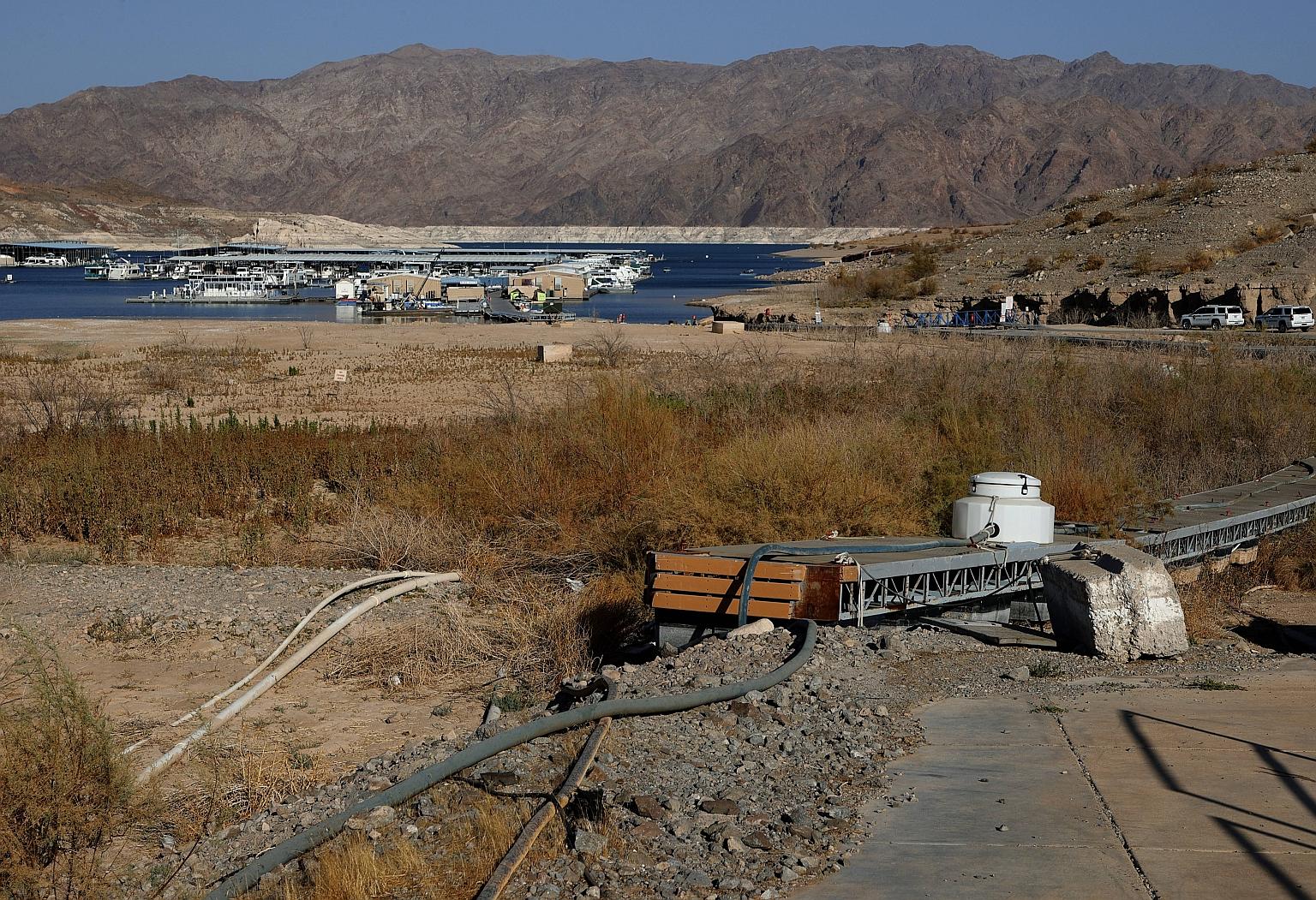US Senate faces hard battle amid doubts over infrastructure plan
Republicans against spending trillions, tax hikes to fund Biden's ambitious agenda
Sign up now: Get ST's newsletters delivered to your inbox

Boats moored in the distance behind a defunct bridge that once led visitors to the Callville Bay Marina in the Lake Mead National Recreation Area, Nevada. The proposed bipartisan infrastructure deal would pay for rebuilding roads, bridges and other traditional infrastructure projects.
PHOTO: AGENCE FRANCE-PRESSE
WASHINGTON • The US Senate returned on Monday to one of its most ambitious agendas in years, with Democratic President Joe Biden seeking trillions of dollars in infrastructure spending and Republicans promising "a hell of a fight" against tax hikes to pay for it.
Senate Majority Leader Chuck Schumer opened the Senate following a two-week July Fourth recess, saying progress was being made on both a bipartisan US$1.2 trillion (S$1.6 trillion) infrastructure plan and the first step towards another measure that would pass with only Democratic votes.
But given the 50-50 split in the Senate, it was uncertain whether the Democratic leader could fulfil his goal of passing both measures through the chamber by some time next month.
"If and when we succeed, the benefits will reverberate across the country for generations to come," Mr Schumer said.
Work continued on the bipartisan part of the package, which Mr Biden has touted to voters, but the top Republican on the plan, Senator Rob Portman, told reporters he did not know when detailed negotiations would be completed.
Mr Roy Blunt, a member of the Senate Republican leadership, said it would be "a pretty amazing thing" if a Bill winning the support of all Democrats could also capture the 10 Republicans necessary to push it to passage.
Last week, Mr Schumer's Republican counterpart, Mr Mitch McConnell, promised a "hell of a fight" over the expected next phase of the process - a partisan, Democratic initiative - while leaving open the possibility of his support for the emerging bipartisan Bill.
Negotiators were still discussing ways to finance the latter measure's US$1.2 trillion price tag, according to lawmakers and congressional aides.
Democrats control both chambers of Congress by razor-thin margins and can afford to lose only a few votes in the House of Representatives and none in the Senate if they are to succeed. They view the overall infrastructure package as potentially the most important legislation to push through before next year's elections, which will determine control of Congress for the second half of Mr Biden's four-year term.
The bipartisan deal would pay for the rebuilding of roads, bridges and other traditional infrastructure projects and take broadband Internet service to more rural areas.
Mr McConnell said there was "a decent chance" the bipartisan Bill could gain traction, but warned the spending must somehow be financed without adding to the national debt.
Speaking at public events in his home state of Kentucky last week, Mr McConnell saved his grim assessments for tax hikes in the other infrastructure legislation Democrats are expected to produce in addition to the bipartisan Bill.
"This is going to be a hell of a fight... This is not the right thing to do for the country," Mr McConnell warned as he attacked Mr Biden's plans for possible tax increases on corporations and the wealthy to help finance the cost of some infrastructure investments.
-
Planned projects and proposals to finance spending
WASHINGTON • President Joe Biden is seeking trillions of dollars in infrastructure spending. Here are some of the details of his US$1.2 trillion (S$1.6 trillion) infrastructure plan:
NEW SPENDING
• Roads, bridges and other major projects: US$109 billion
• Power infrastructure, including grid authority: US$73 billion
• Passenger and freight rail: US$66 billion
• Broadband Internet infrastructure: US$65 billion
• Water infrastructure, such as eliminating lead pipes: US$55 billion
FINANCING
The plan includes a number of proposals to finance the spending. Republicans sketched out those plans:
• Improve tax enforcement: Net increase of US$100 billion after US$40 billion is invested in enforcement
• Public-private partnerships and "direct-pay" municipal bonds: US$100 billion
• Redirecting unused Covid-19 relief funds: US$80 billion
• Proceeds from 5G wireless networks spectrum auction: US$65 billion
• Estimated macroeconomic impact of infrastructure investment: US$58 billion
REUTERS
Corporate lobbyists, in concert with Republicans, were laying plans to thwart the initiative, arguing that tax increases would hurt a United States economy emerging from the damage of the Covid-19 pandemic.
One measure, to be hammered out before the start of the August recess, would simply provide the technical framework for ramming through the Senate - without Republican support - a second, bigger infrastructure measure.
That Democrats-only plan would require a manoeuvre called "reconciliation" that skirts Senate rules requiring 60 votes to pass most legislation.
REUTERS


